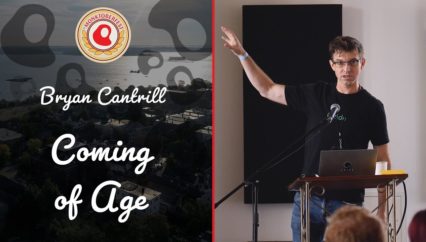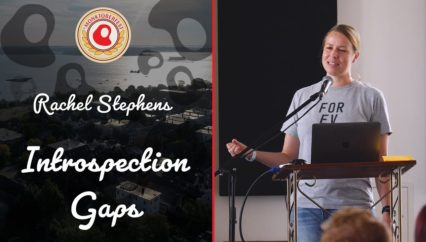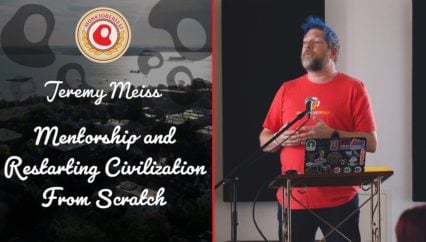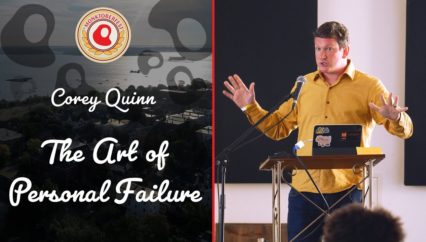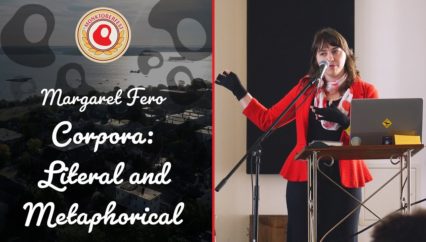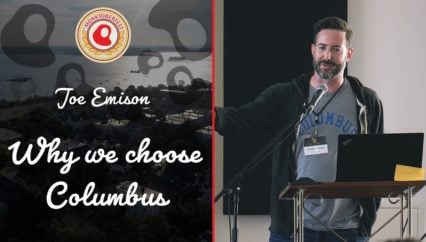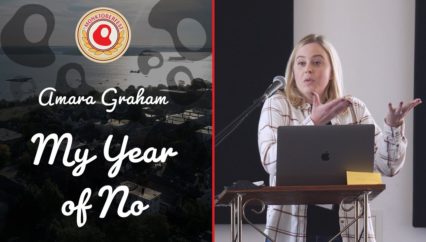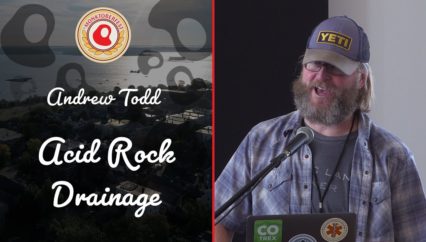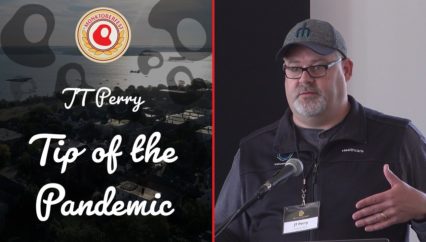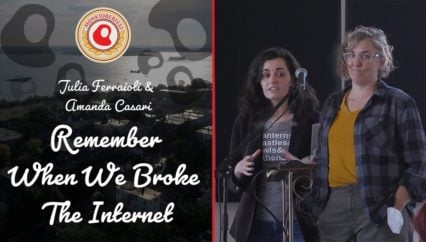For some, the journey into tech is a simple affair. For others, particularly those who are under-represented in the industry, it can be incredibly arduous or even impossible. This talk describes one personal journey into tech — the good and the bad — and serves as a reminder to all that there are incredible people with much to contribute trying to break into tech and all that they need is the opportunity.
Transcript
Hi, everyone. Thanks, Steve. OK, everything you want is on the other side of admin privileges. So hi, everyone, my name is Ann, I’m a copy editor, turned software engineer, and right around this time last year, I received an email asking me to share my story about my journey into tech.
And I’m excited to be here to do that because giving a talk at Monktoberfest really brings this journey all the way around. This is my third Monktoberfest. My first was in 2018, and that trip was intended to serve as a litmus test for whether the tech space was one that I could see myself in.
When you don’t see yourself represented in a given space, I think it’s really easy to assume that you just don’t belong there and that’s the head space that I was in. I was invited by some of my favorite people, Devon Jo, Rachel Stevens. Yeah, round of applause.
And I think they sensed my trepidation to enter this space. Knowing tech as an industry I don’t often see myself represented but with substantial assistance from the I & D scholarship, we were able to make this happen for me and I’m so glad because those three days meant and changed everything. I had the opportunity to hear Lia McGowan-Hare talk about empowering your community through tech and I remember hearing that talk and feeling really seen. My motivation in joining the industry was to help people and really to better serve and empower those who I saw deeply impacted by the digital divide, and in hearing that talk and hearing her words, I really finally saw myself and that was only to know that I was exactly where I was supposed to be. That’s the power of this incredible conference, it’s the impact of great speakers, and the importance of representation. So my interest in computers initially stemmed from circumnavigating parental controls and burning dope CD mixes with music I found on Livewire.
In the before times, if you had AOL, you had the ability to create an AOL profile, which was more or less a blank Teixeira that you could fill with whimsical ASCII art, shout out to the new ones, euphemisms you’re way too young to understand, hypothetically speaking. You could think of these profiles as early Twitter, a quick glimpse into the persona of the person you’re messaging, where the profile itself may serve as your bio, away messages functioned as original posts. Bad day, sad away message, good day, upbeat messages, but you only had the ability to navigate the space if your parents loved and trusted you enough to make good decisions on the internet. My parents loved me but they knew that the internet was big and expansive and — thanks, mom and dad. So I began a long con of perpetually and inadvertently spamming my dad’s email address with password reset requests. This of course never worked, but I did eventually see my dad entering his password and was able to build the majestic cringe-worthy AIM profile of my dreams. This taught me that everything you could ever want is on the other side of admin privileges.
I went to college at the University of Michigan and I hadn’t really thought about a career concerning computers until I stumbled into some informatics classes that I really enjoyed. You can think of informatics as the intersection between information research technology and people.
I had an instructor named Robert Frost, who was actually —
[laughter]
I think he is the great-grandson of Robert Frost. And I had some incredible lectures with him. He led a course on Virginia Woolf’s literature, Jane Austen’s literature and he was such a great instructor, I couldn’t get enough and I looked into what else he was teaching he had some great classes in informatics, the ethics of research and things like that and I took all of them and I loved it.
I — I was a few credits short — oh, so I loved it so much that I decided to double-major in English and literature and informatics, and a few credits short of completing that degree, I needed to take an intro to Python class.
I remember getting ready, I walked into the room, there was maybe 50 to 100 people, mostly men, and I remember that first day hearing questions I would never think to ask with vocabulary that I couldn’t fathom knowing, certainly didn’t know it at the time. And I didn’t realize it then, but I doomed myself to withdrawing from that class the moment that I decided that I didn’t belong there. I was actually practicing this part of my talk with my partner and I was telling her — I was explaining this environment and I was like, they just seemed like they belonged there. Which I think, you know, inherently or perhaps implicitly meant, I really didn’t feel like I did.
I wish I could tell you that I excelled, that I was at the top of my class, that before long I was asking and answering new questions and using new vocabulary, but truthfully I dropped the class after I flailed through midterms. My new mantra with things that didn’t come naturally to me is that I wasn’t good it. I leave the computers to men.
After school, I moved back to Connecticut for a few years doing odds and ends work, then to Denver, Colorado, continuing to do odds and ends work. I eventually reached out to my dad and kind of lamented on a career that was tech adjacent. If I couldn’t, you know — if I couldn’t succeed in a Python class, maybe I could do something that I felt came more naturally to me, but still in the tech sector, like writing or copy editing. He told me about the RFC editor, which is a team of technical copy editors that review and polish internet architecture standard. He had been a member of this community for years.
I wasn’t sure what all of those acronyms meant, but I asked if he knew whether they were accepting volunteers, and he said he’d look into it.
It turns out they weren’t looking for volunteers, but they were ready to hire. And I established some new contacts, met ha man, Fred Baker, who met with me and talked about what a transition into this space may look like. I applied and then within a couple of months, I was working for the RFC editor. As an aside, the RFC editor is contracted to a company called association management solutions which was founded about I three badass women who happened to be some of the most kind and enjoyable people I ever met. The RFC editor is comprised of people equally badass. And I spent the next few years trying to be half the people that my colleagues were.
But by the middle of my tenure at AMS, I longed I was at this point in my life I was in my mid to late 20s, I was broke, I was living in downtown Denver, my mother was diagnosed with dementia in early 2016 at the age of 53, and though her diagnosis was more of a formality, because her symptoms had been manifesting for some time and they were brutal to watch.
My family structure that I’d come to know was pretty quickly and inelegantly unraveling. My lonely partnership has evolved into a lonely marriage and I was almost consistently keeping our rent and bills paid while my then partner was in school full time.
My work was really the one thing holding me together. But I couldn’t concentrate and I felt a lot of shame and guilt knowing that as much as this job empowered me and as much as I loved my team, I really wanted something else and something a little bit more. So my escape came in the form of the Denver Public Library. I’d disappear amongst the stacks of books and until either I felt better or the library was closing, I’d just kind of hang out and most often I’d leave because of the latter.
I eventually wandered onto the fourth floor which used to be the community technology center.
And it’s a really cool space. It’s — this is what it used to look like. It’s filled with computers, there’s a help desk in the middle and I fell in love. I remember kind of like walking around and there was this lab with 3D printers and all of this cool stuff, and everyone seemed really eager to talk to me, just because I seemed interested.
I also found a schedule of free technical classes and I gorged them. I began filling my evenings and weekends with these classes. Intro to Python, intro to HTML and CSS, building your own web page. My favorite was a weekend course, dedicated to taking a computer apart and putting it back together. I started dissecting my own machines at home. I fixed a failing external heart drive. I walked my aunt into the world of wifi from a dial-up connection. I went to a bootcamp called the Turing School of Software Design.
For the things I historically couldn’t keep up with, those things became hobbies that I really intentionally targeted to get better at: Math, physics, procrastination, but also self-love, forgiveness and healing.
I began volunteering at the CTC and that brought me some of the purest joy I’ve ever known.
It was also some of the most meaningful work I’ve ever done.
I walked patrons from all walks of life through creating Gmail accounts, checking email, writing email, storing documents, differentiating between mouse clicks, which is surprisingly hard to explain. While this work allowed me to make what I felt was a truly meaningful impact, I did have a lot of really sobering realizations during my time there.
So the first is that it’s assumed that everyone has access to a stable internet connection. The second, it’s assumed that most adults have cell phones that are smartphones.
And then third, it’s assumed that most adults know how to maneuver said smartphones and technologies with a modern expectation of digital literacy.
The implications of these assumptions, were only widening the fissure created by the digital divide and for those of you who may not know, you can think of the digital divide as the gap between those who have access to the internet and internet-consuming technologies and really with that modern information and those who don’t. Oops, spoiler. OK. I remember one of the last few months that I was volunteering at the community technology center, I had just helped someone set up a Gmail account. He was getting ready to — I forget what he was doing, but nonetheless, he needed a Gmail account, and we made one together. And as I was walking away, I remember him stopping me and just, you know, being like, hey, thanks, I really appreciated your help, and I was like, oh, yeah, of course, and he was like, you know, I just got out of prison, and in those five years, the whole world is different. Ooph! That really stuck with me.
After that I met with my aunt, after enough ping-ponging, they lost patience with her and they said, just send a picture with your phone but she was on a fixed income and she has a flip phone with paid minutes. I decided to go back to school. I didn’t know when or how but I knew I was a different person from the one who walked into a programming class in college and talked myself out of an informatics degree. I had tools I didn’t have before. The awareness to know not all learning styles are the same and the grace to be patient with myself learning new things but for all the confidence and self-assurance I had to get started, I’d be lying if I said I wasn’t scared. What if I can’t keep up. What if I’m not smart enough, what if instead of letting myself down I let everybody else down who believed in me. Some friends I owe everything to suggested I come to a conference with them in the first weekend in October in Maine and the rest is history.
I graduated from the Turing School of Software and Design, I signed an offer letter the day of graduation.
[applause].
It was the hardest thing I’ve ever done but over the last ten years I’ve learned I can do hard things. Whew!
[applause]
Thanks. Just a few more things. My point is, think about what you can accomplish just by welcoming yourself into a space you don’t see yourself in. You’re more than the sum of what you’re not. And you deserve admin privileges over your own story. Good luck, but I don’t think you need it.
[applause]
